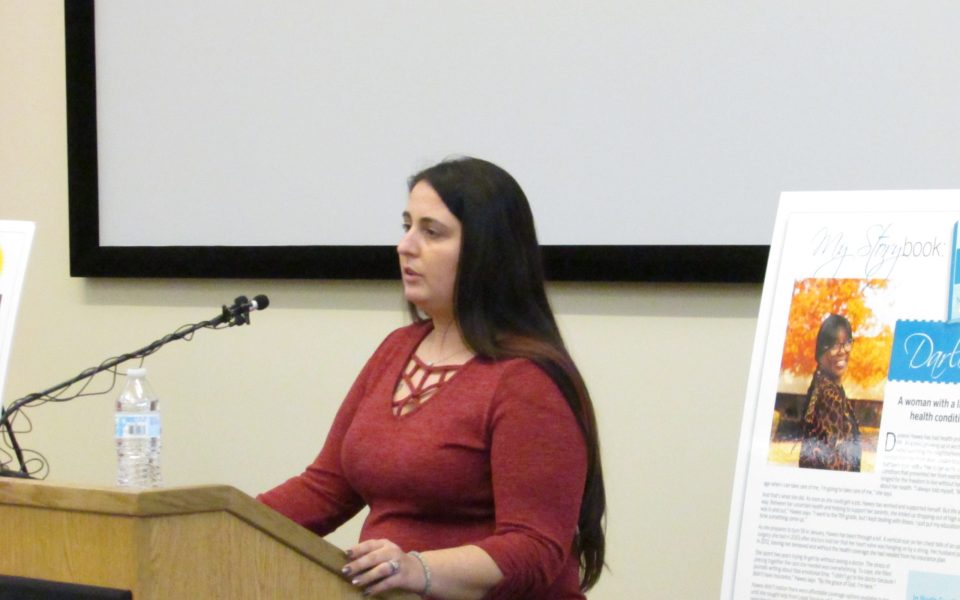Christy Solomon was struggling with
an addiction as a resident of Rockingham County. With her mother’s help, she
found a treatment program across the state line in Virginia, but she wasn’t
able to stay with it long because she had criminal charges there.
There were “no recovery support or
resources, no jobs” in Rockingham County, so Solomon and her partner moved to
Wilmington. Because she’s uninsured, she has to pay out of pocket for
bloodwork, and has had to miss work for doctor and dentist visits because local
providers are prohibitively expensive.
Her best friend, who was also
uninsured, died from an overdose in January 2018. Solomon thinks her friend
might be alive today if she and her husband had insurance and had been able to
access treatment.
“Regular
people, addicts, people with mental health issues, they just want a chance at
life, too,” said Solomon, who works as a restaurant server. “That’s why we seek
recovery and we seek treatment. It was so hard for me to get in a treatment
facility because I had no insurance.”
Since
2013, Republican lawmakers have repeatedly rejected entreaties to expand
Medicaid to cover those who make more than the federal poverty level — the
current cutoff for the program — but less than 138 percent of the federal
poverty level required to qualify for subsidies under the Affordable Care Act. For
a family of four, the coverage gap falls between $25,100 and $34,638.
North
Carolina is one of only 13 states that has refused to expand Medicaid while
turning away billions of dollars in federal funding and leaving hundreds of
thousands of residents without coverage. One of the powerbrokers responsible
for denying people like Solomon coverage is Phil Berger, the Republican leader
of the state Senate, who represents Rockingham County.
“Because
of this misguided decision I continue to see many folks frozen out of our
healthcare system,” said Dr. Steve Luking, who maintains a family medical
practice with his brother in Reidsville.
Luking said he recently saw a
patient whom he had previously hospitalized for a serious stroke. The man
stopped showing up for regular checkups after he, along with hundreds of
others, was laid off from the MillerCoors plant in Eden, and his insurance
eventually ran out. Luking said his patient came back complaining about “bad
headaches, high blood pressure through the roof, and out of all his
medications, which prevent him from having another stroke.” The man refused to
get the bloodwork that Luking ordered because there was no way he could afford
the $200 bill.
“I
don’t know if I’ll see him again, or when I’ll see him again,” Dr. Luking said.
“I just know he’s at serious risk for another stroke. The next one will likely
put him in a nursing home.”
Just
25 miles to the north, the fortunes of the working poor have dramatically
turned.
Jean
Jackson, of Danville, Va., was driving home from a second-shift job at night
when she began to have trouble with her vision. An eye doctor told her she had
cataracts.
“I
walked around for a year with blurry vision and getting home before dark if I
had to drive was a must,” she said. In July 2017, she made the difficult
decision to retire early at the age of 62. On one hand she knew that by retiring
she would lose health coverage, but she also knew it wasn’t safe for her to
continue driving at night. The following spring, Jackson also received a
diagnosis of Type 2 diabetes, and wondered how she would be able to afford to
pay for medication.
But
in May 2018, the Virginia legislature voted to expand Medicaid. Up to 375,000
residents are expected to be added to the rolls, according to a report in the Washington Post.
Jackson
received a letter stating that she was approved in December. As a result, on
Feb. 8, she will be able to get cataract surgery.
She
held up the letter during a press conference hosted by the NC Justice Center at
Rockingham Community College on Tuesday.
“When
I opened it, I danced like David danced because I’m going to be able see again
and I’m going to be able to drive at night,” Jackson said.
“Medicaid
expansion gave me hope because now I’m learning how to take care of myself so I
can have a longer, happier life to share with my children, grandchildren and my
great-grandchildren.” Jackson added.
Solomon,
who left Rockingham County to get treatment in Wilmington, said she won’t return.
Her partner has a good job in Wilmington and there’s not much reason to look
back. But she hasn’t forgotten.
She
remembers working at Chaney’s Restaurant in Eden with her mother for a period
and serving Phil Berger.
“I
just don’t understand how Phil Berger can sleep at night,” Solomon said. “He is
the voice for Rockingham County, and he’s not speaking up at all. People in
Rockingham County are dying all the time. My newsfeed on Facebook is filled
with it. My heart’s broke from my best friend dying. I deal with it every day.
Five years ago, if he would have voted yes, she would still be here.”
Join the First Amendment Society, a membership that goes directly to funding TCB‘s newsroom.
We believe that reporting can save the world.
The TCB First Amendment Society recognizes the vital role of a free, unfettered press with a bundling of local experiences designed to build community, and unique engagements with our newsroom that will help you understand, and shape, local journalism’s critical role in uplifting the people in our cities.
All revenue goes directly into the newsroom as reporters’ salaries and freelance commissions.


Leave a Reply